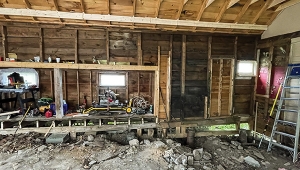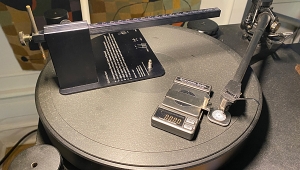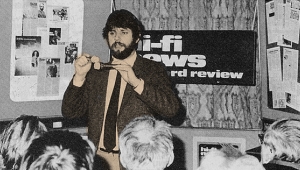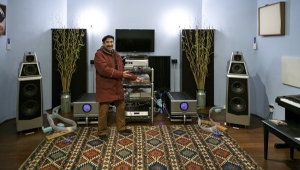| Columns Retired Columns & Blogs |
One by One: the Cantus Recording Project
 Just who were these guys?—Wes Phillips
Just who were these guys?—Wes Phillips For me, it all began one soft October evening in 2000. John Atkinson invited me to attend a concert with him. When I accepted, he proposed picking me up at what seemed an unusually early hour. "It's in Princeton, New Jersey" he explained, and off we went.
When we arrived at the Nassau Presbyterian Church there, Cantus had already taken the stage. The audience, raptly attentive, consisted of several hundred boys and young men—entire rows of them dressed identically; it turned out they were from choral schools—and an equal number of more typical concertgoers. We found seats and turned our attention to the stage. There, 11 men in their early to mid-20s were singing Kenneth Jennings' setting of Dylan Thomas' "Do Not Go Gentle into That Good Night":
And you, my father, there on the sad height,
Curse, bless, me now with your fierce tears, I pray.
Do not go gentle into that good night.
Rage, rage against the dying of the light.
The emotional intensity of the words was matched by the performance—"Rage, rage," indeed. But Jennings' setting also promised peace beyond death's dominion.

By the end of the concert, we'd been charmed by the inspired silliness of Richard Genèe's "Insalata Italiana," soothed by lullabies (including bass-baritone Erick Lichte's ineffably beautiful arrangement of Billy Joel's "Goodnight My Angel"), and swept around the world by songs sung in Hebrew, Latin, Zulu, Gaelic, Spanish, and music-manuscript Italian—in addition to English, of course.
And, like the rest of the audience, John and I rose to our feet cheering at the end of it all. As one with the crowd of choral students, parents, and music lovers, we weren't merely impressed: we were converted. We'd shared a profound musical experience with the rest of the audience. We believed in the power of men singing. We believed in Cantus.
But just who were these guys?
Hold tight my people, don't get weary, don't lose your strength.
We can see they wanted to hold us back.
They will not succeed, we will win because we know who we are.—"One By One"
The group's mission statement declares that "Cantus is a professional, male vocal chamber ensemble dedicated to exalting the human spirit through the performance of innovative and engaging musical programs....Cantus champions male choral singing and encourages people of all ages to sing."
Bass-baritone Erick Lichte puts it like this: "Cantus is an experiment in traditional ways of making music. We make music in a setting that is fully collaborative, much like a chamber music ensemble. A traditional choral group operates with some kind of director, whether or not they have a conductor on stage. Someone is rehearsing the group, making musical decisions, and enforcing a vision concerning repertoire and performance.
"We collaboratively decide all that, from the songs we choose to the performance techniques we employ. This approach generates more organic performances. We can create music on the spot, since nothing has been set down as far as interpretation is concerned—our performances can change from night to night or, more properly, from acoustic to acoustic, since we have to make adjustments in timing and interpretation for each new venue in which we perform."
Now we begin the judge's dance.
Everybody sing "Ha ha ha."
Everybody sing "Ho ho ho."—"Domaredansen"
Although Cantus has been together for six years, John and I caught them in only the second month after their conversion to a full-time, professional (but non-profit) performing organization. The following March found us lugging recording gear through the melting snow into the Concert Hall at Carleton College in Northfield, Minnesota. John had signed on to record Cantus' fourth CD, Let Your Voice Be Heard, and I had agreed to serve as official witness, gofer, and what-have-you. We had slightly over three days to make a record.
- Log in or register to post comments




































